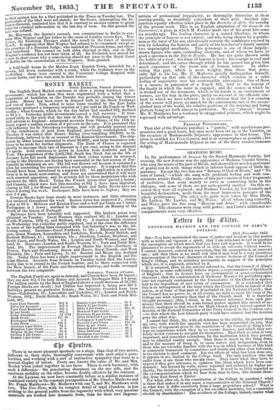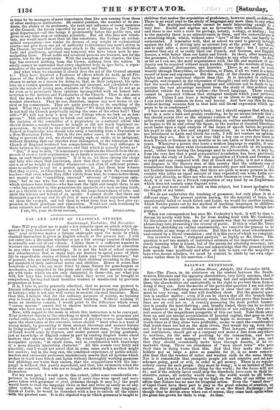tattr5 ta hitnr.
PROFESSOR )IAIIItICE AND THE COUNCIL OF RING'S COLLEGE.
25th November 1853.
Six—You have maintained the cause of justice and freedom in this matter with so noble and vigorous a spirit, that I am reluctant to call in question the assumption on which much that you have said depends. It would be far pleasanter to accept the arguments of so able an advocate without reserve. I cannot, however, conceal my conviction, that the assumption is an unsound one ; and that there is no small risk that it may lead to a very disastrous misconception of the real character of the recent decision of the Council of King's College, and to mistaken movements in support of the principles which are, it is supposed, attacked by it.
It is assumed, then, in the articles referred to, that the Council of King's College is, in some sufficiently definite degree, a representative of the Church of England ; that its decrees have an ecclesiastical or quasi-ecclesiastical character; that the condemnation of Professor Maurice for publishing opin- ions not expressly condemned by the Formularies of the Church is equiva- lent to the imposition of new terms of communion. It is contended that this is an infringement of the trust which the Council holds in behalf of the nation, or at least of that part of it included in the National Church; that the Council has no power, or, at all events, no right to make the basis of the College one whit narrower than that of the Church itself. It is therefore thought necessary, (this, I think, is the natural inference from such pre- mises,) that there should be some formal protest against this stretch of-au- thority, analogous to that which the High Church party entered against the decision of the Judicial Committee of the Privy Couucil in the Gorham case, —to that which the Low Church party would have entered had the decision gone the other way. I cannot but think, Sir, with all deference to the ability, far greater than my own, with which the opposite view has been maintained by you, that this line of argument gives to the resolutions of the Council of king's Col- lege an importance which they by no means deserve, and which they cer- tainly do not venture to arrogate for themselves. That their decision is very important, and somewhat calamitous for the institution which they govern, may be admitted readily enough. That there is much in the thing done, and in the manner of doing it, to cause sorrow and indignation, even in those who are tolerably familiar with the way in which business of this kind is commonly transacted by committees and boards and other close tribunals, is too obvious to need comment. But the effects of what has been done are, it appears to me, limited to the College itself. The only teachers who can suffer from it are those who rerrain there. They know what they have to expect if they give utterance to opinions like those which have been con- demned; but beyond its walls, unless repeated and enforced by higher au- thority, the decision is absolutely powerless. It need be as little regarded as the excommunications which we hear from time to time, like distant thun- der, from East Brent or Exeter. For what, after all, is the constitution of the College in question ? what is there that makes it in any sense a representative of the National Church ? in what does it differ essentially from a large proprietary school? What is the Council, with the exception of a few ex-officio members, but a committee elected by shareholders ? The accidents of the College, indeed, render what is done by its managers of mere importance than like itets coming from those of other analogous institutions. its central position, the number of its stu- dents, the ability of its professors, the rank and influence of many members of the Council, the favour conceded by most of the Bishops to the Theolo- gical department—all this brings it prominently before the public eye, and gives to any false step an unhappy notoriety. But all this does not consti- tute, nor would much more than all this constitute, the College an ecclesi- astical corporation—nor render its decrees of any weight in ecclesiastical courts—nor give them onejot of authority to determine any man's status in the Church, beyond that which may attach to the opinion of the individual lords and gentlemen, spiritual and temporal, who have taken part in pro- mulgating them. Those noble and reverend persons are trustees, not for the nation, but for the proprietors. With the exception of the charter, the Col- lege has received nothing from the Crown, nothing from the nation. It surely cannot be contended that every. chartered body is, ipso facto, a repre- sentative of the national constitution in Church and State. And what when we examine it closely does the act of the Council amount to ? They have deprived a Professor of offices which he held, as all Pro- fessors of the College do hold them, during their pleasure. They have chosen to assign as a reason for doing so, that, in their judgment, his opin- ions on a certain question are dangerous and unsound, and calculated to un- settle the minds of young men, students of the College. They do not go so far even as to pronounce those opinions incompatible with an honest sub- scription to the Articles and Formularies of the Church. They do not assert that the man who holds them ought to be excluded from the office of a teacher elsewhere. They do not, therefore, impose any new terms of cle- rical or lay communion. They are quite powerless to do any thing of the kind. What they have said is simply this—" We think this man unsound." Ia not half the Church perpetually saying the same of the other half? They add—"We will not keep a man in our College whom we look on as dan- gerous." This addition may be harsh and unwise. So would be, perhaps, the decision of the committee of a proprietary or a national school who should dismiss a master because he taught or did not teach baptismal re- generation. So would be the exercise of power by the Head of a House at Oxford or Cambridge who should take away a tutorship from a Tractarian or a Non-Tractarian Fellow. But in the two latter cases, if we could do no- thing to prevent the evil, we should simply sigh, or smile, or be indignant, without thinking that our liberties were endangered, or the toleration of the Church of England rendered less comprehensive. What real differepce is there between the supposed instances and that which is actually before us ? "But," it may be said, "it is necessary to vindicate the Church from the re- proach of even a tacit acquiescence in so harsh a measure against so great a man, on such inadequate grounds." If it be so, let those among the clergy and laity who share that conviction, show that they regard the recent de- cision as of no weight or validity whatsoever—not even of sufficient preten- sions to authority to call for a protest against it. Let them bear witness that they -rejoice, as Churchmen, to claim fellowship with the condemned teacher—that even where they differ widely from him, he comes before them, not merely as the " unsettling, unsound ' advocate of " dangerous opin- ions," but as one who has led many men beyond systems to the truths which systems have hidden—who has seen the light and taught them to see —.who has presented to this generation the spectacle of a man seeking truth, not as a theorist or a disputant, but with the large-heartedness of love, and amid the labours and travail of an apostle. I cannot doubt that there are thousands eager to say and do all this, if men of sufficient reputation would set them the example, and tell them in what form they may best give ex- pression to their gratitude and admiration. Would not such testimony be more valuable now and hereafter than a hundred protests?



























 Previous page
Previous page